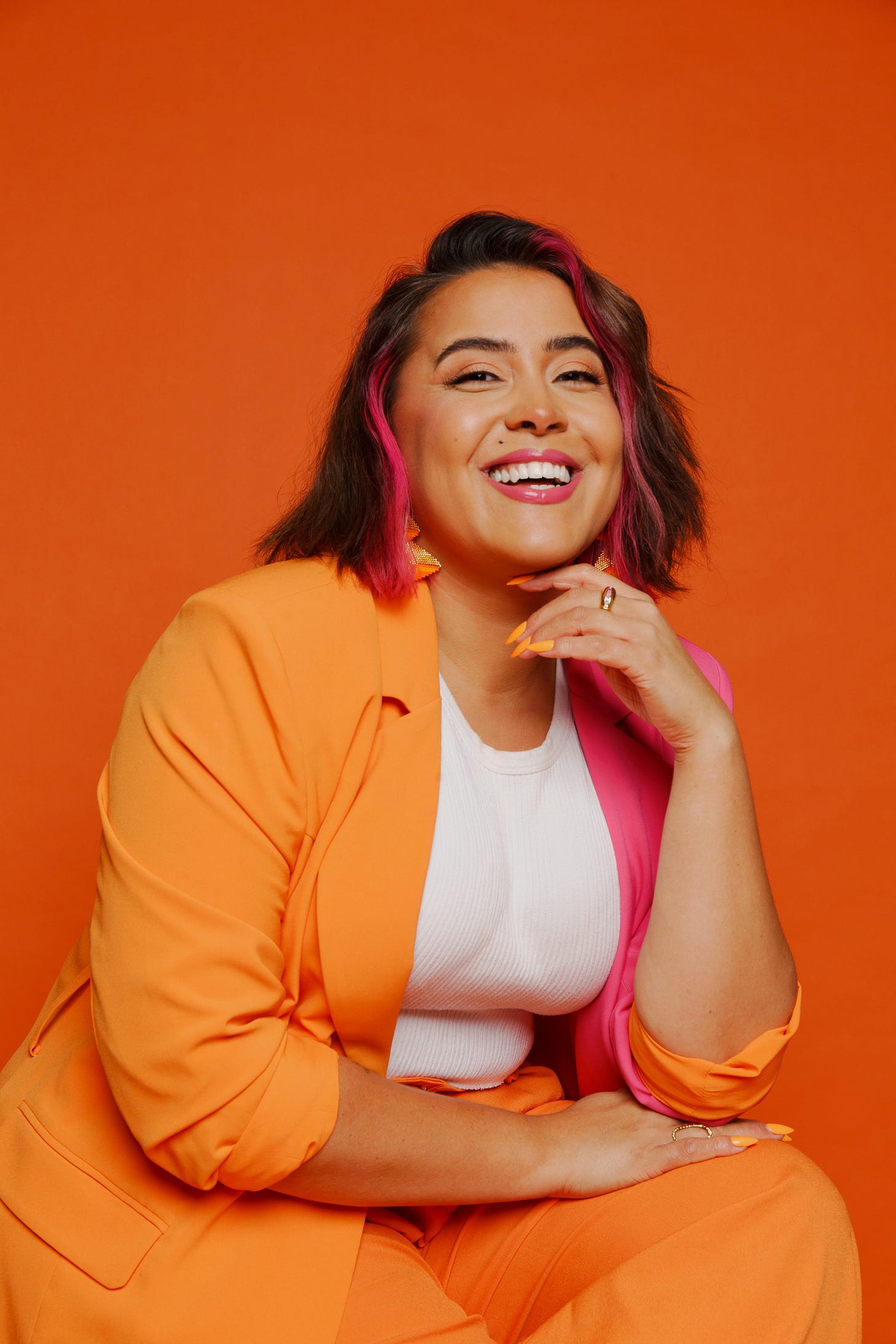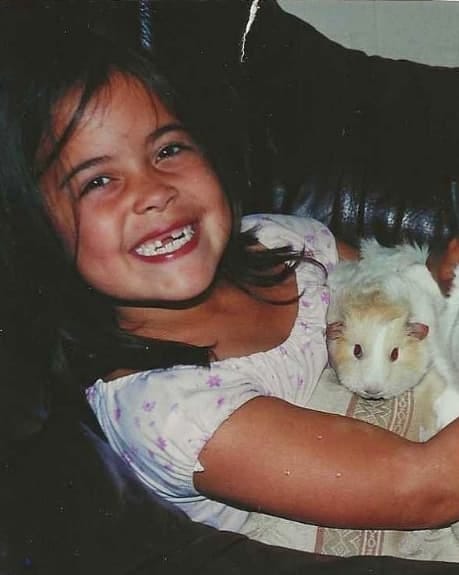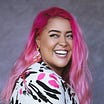Megan Jayne Crabbe: “Who better to see both sides than someone in the middle of things?”
The author and presenter on racial awakenings, finding comfort and leaning into grey areas
Hi, welcome back to Mixed Messages! There’s just ONE DAY until Mixed Messages Live! On Tuesday 1st July, we’ll be at Lush Beak Street with William Hunter, Deepa Paul and this week’s guest, Megan Jayne Crabbe. Books will be on sale with Round Table Books, Crazy Gin will be back with gin and non-alcoholic cocktails and you’ll take home an amazing goody bag worth over £50. Last year was such a special evening, I can’t wait to see you IRL again tomorrow!
This week’s guest is author and presenter Megan Jayne Crabbe, who is of mixed-Black Caribbean and white heritage. Her new book, We Don’t Make Ourselves Smaller Here, is out now, encouraging readers to ditch social pressures to live life as our fullest and boldest selves. From race and queerness to body image, careers and dating, Megan covers it all. Did you spy our sneak peek in last week’s Mixed Media? There’s still time to win a copy of the book! Read Megan’s story below, and get your book signed at tomorrow’s event.
How do you define your identity?
I am mixed-race, Black and white. My dad is Caribbean, a little bit African, and my mum is the whitest woman who has ever walked this earth. I grew up in a white, working class town with mainly white friends until my late teens. That aspect of my identity has always been something that I have been confused about.
One of my first days at primary school, a kid must have said something or held up their arm to mine to show they were darker than me. My mum asked how my day was and I said “I don't know anything. I don't even know if I'm Black or white.” That was at four or five years old, and it’s been a theme throughout my life. I've definitely assimilated into different groups in different phases of my life. Now, I'm much comfier with that aspect of my identity, claiming both sides and feeling whole, but it's taken a longer time.
What was it like to grow up in a white space?
I was confused. One of the first things that kids notice is difference, and not only was I the only child with brown skin, I was also quite chubby, and that contributed to my feelings of difference. At the same time, I had this idea that I would inevitably grow up to be a thin, beautiful, white woman with blonde hair and blue eyes. It didn't occur to me that that was not going to be a possibility.
When kids at school started to be racist and learn racist words, I got all of them because I was this ambiguous brown person. When you get into your teenage years, that’s when the white boys start to fetishise you and call you exotic. Suddenly you’re like ‘oh, is it a good thing that I'm mixed? Is it a compliment, or am I being objectified? Should I just take it, because I'm supposed to value this validation for boys and men?’ It's quite hard to figure out what your feelings are on your own identity because you're constantly surrounded by so many other people's opinions.
Was there a tipping point for deciding to embrace all parts of you?
It’s been very up and down, and comes in seasons. I started to feel comfier in my identity when I got to sixth form, the first time I went outside of my small town. I found myself in the group with all the Black kids and they didn't question my presence there. That was incredibly affirming.
When I started my career online, I got uncomfy again. Over the years, so many hundreds of strangers have debated what I am, what I should call myself and what I should speak about. Even last week, I woke up to people on the internet questioning whether I’m Black enough to have an opinion on Chris Brown and whether we should go and dance to an abuser’s music.
I have constantly been navigating people's opinions on that aspect of my identity. That has been uncomfortable and brought up unresolved childhood stuff. A lot of mixed-race, Black and white people had quite a reckoning around the time of BLM and George Floyd, we were feeling both sides and weighing up our place within the system and our responsibility – feeling the weight of trauma and also privilege.
I had a really big identity crisis. I did a lot of inner work and dug into my family history. It was only after that I felt more at peace, even in showing up online as my whole self and not feeling scared to say certain things or worried about how I was referring to myself. It's still a work in progress.
Did you feel the need to almost ‘come out’ as Black to your followers?
I feel that need consistently. For the first half of my online career, I was perceived as white. I’m very light-skinned and have rainbow coloured hair that isn't textured. I get Latina more often than I get Black. Why is the default assumption that someone's white? Can we expand our visible markers for recognising whether someone is mixed-race? Mixed-race people do not all look the same. It’s the same with queerness – you can say it again and again and again, and people will miss it or disregard it.
Something that made me very hesitant in claiming my Black heritage is the fact that I don't want it to come across as if I'm unaware of the light skin privilege that I have. I’m so aware that it has impacted every single layer of my life. I probably would not have the platform that I have if I had not been perceived as racially ambiguous or ‘white passing.’ To claim my Blackness felt like a potential disrespect to people who have darker skin than I do, who are having a wildly different lived experience.
Has your race played a part in your body positivity journey? For me, it took a long time to realise that I have the exact same body shape as my mum and granny, and maybe I’m not meant to be super slim.
For sure. Growing up, I disregarded the fact that I had Black heritage when I pictured how my body should look. I was comparing myself to the beauty standard that we all got, which was thin, white, young, able bodied and cisgender. I genuinely thought I was going to look like Rachel Green. Because my mum is white and blonde and blue eyed, perhaps that added an extra layer of thinking that could be possible.
No one ever told me that maybe my body was supposed to be sturdier, maybe I was meant to be a bit thicker, because I have this heritage and my ancestors would have a different distribution of body fat compared to white people. Even just a couple of years ago, I came across a picture of my grandma on my dad's side at the beach in a swimsuit. I was like, ‘oh, that's my body. Wait, I was always supposed to be this shape.’
What was your cultural upbringing like?
It was very limited. We lived really far away from relatives on the Caribbean side. My grandparents were some of the first people to ever emigrate to the UK, much earlier than Windrush. In order for them to survive, they had to assimilate a lot and dropped their accents. That got passed down to my dad, so he didn't have much of it, and as a result, we had very, very little. In hindsight, it’s really evident that I was desperate for some kind of cultural connection because I was obsessed with Cool Runnings.
That wasn’t the fault of my parents, it's what they had. Also, growing up with a disabled sister, her needs were at the forefront of a lot of our childhood. The priorities of the family weren't necessarily keeping cultural traditions alive.
How do you want the conversation around mixedness to develop?
I'm just tired of other people telling mixed people how they are allowed to identify. We clearly don't have the same colour charts because there's no consistency. It’s exhausting.
I would like mixed people to be allowed to explore and claim their identities for themselves, and for the world to be a bit more nuanced in its interpretation of racial identity. More grey areas, less black and white thinking.
What’s the best thing about being mixed for you?
I said to my mum years ago that I felt like I was in the middle of things. She replied, “who better to see both sides?” I don’t think I would have the perspective, the empathy or the awareness that I have now if I had not been here in the middle of things.
I have felt in the middle in a few ways: being mixed-race, being not quite fat, not quite thin, being queer, but not feeling queer enough for a long time. As much as it has caused me confusion and internal struggle, it has made me the person who can see both and all sides and have more perspective. I am thankful for that.
How would you sum up your mixed experience in one word?
Tumultuous. The journey has had ups and downs and there’s lots of uncertainty, but hopefully I’m entering a period of peace.
Have you got your tickets to Mixed Messages Live yet?! Get them here to hear Megan speak IRL, and get your copy of We Don’t Make Ourselves Smaller Here from Bookshop, Amazon or Waterstones. Next week, I’ll be speaking to actor and writer Gracie Oddie-James. Subscribe to get Mixed Messages in your inbox on Monday. Shop Mixed Messages tote bags and bookmarks on Etsy now!
Enjoy Mixed Messages? Support me on Ko-Fi! Your donations, which can start from £3, help me pay for the transcription software needed to keep this newsletter weekly, as well as special treats for subscribers. I also earn a small amount of commission (at no extra cost to you) on any purchases made through my Bookshop.org and Amazon affiliate links, where you can shop books, music and more by mixed creators.
Mixed Messages is a weekly exploration of the mixed-race experience, from me, Isabella Silvers. My mom is Punjabi (by way of East Africa) and my dad is white British, but finding my place between these two cultures hasn’t always been easy. That’s why I started Mixed Messages, where each week I’ll speak to a prominent mixed voice to delve into what it really feels like to be mixed.











